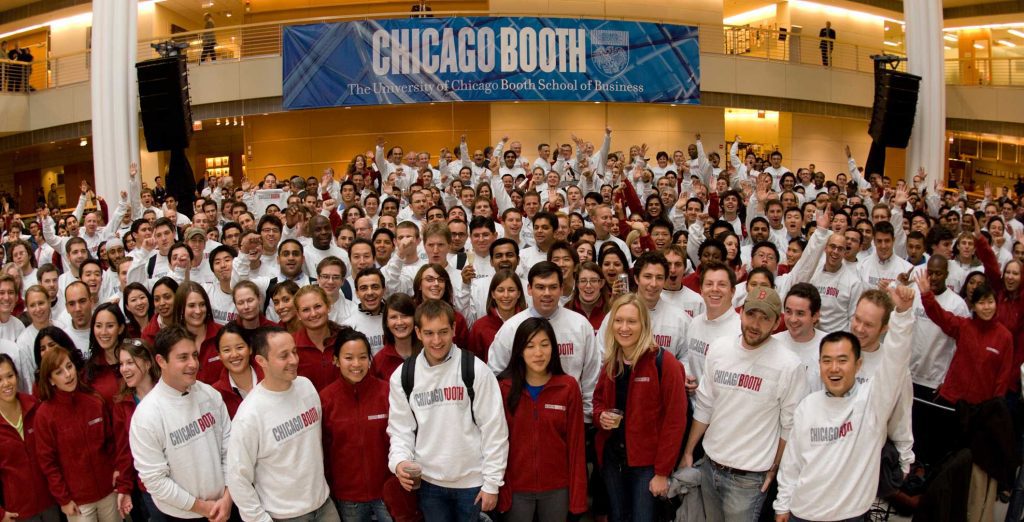Finding A Real Estate Career with a Chicago MBA

The number of MBAs who pursue a real estate career may not be as large as those in finance or consulting, but even still, some of the most prestigious business schools in the Chicago metro offer MBA programs that specialize in the field. Continue reading…
U. Chicago and Northwestern Deadlines, and More – Chicago News

Let’s explore some of the most interesting stories that have emerged from Chicago business schools this week.
University of Chicago and Northwestern University Reveal 2018-19 MBA Deadlines – MetroMBA
Both of Chicago’s top-tier business schools—Chicago Booth and Northwestern Kellogg—have announced deadlines for the upcoming MBA application season, starting this fall and extending into April of 2019.

Northwestern Kellogg MBA deadlines for 2018-19 begin Sep. 19, 2018 / Photo via northwestern.edu
How Superstition Changes the Way We Make Decisions – Kellogg Insight
Northwestern University Kellogg School of Management professors of marketing Ping Dong and Aparna Labroo recently published new research that explored the impact of superstitious actions on everyday decisions in an edition of Kellogg Insight.
According to the article, they were specifically interested in understanding how they “changed the way we calculate our odds of success or failure when deciding whether to do something risky.”
Labroo uses their study as an opportunity to suck the metaphysical life out of superstitious actions: “We can think about all kinds of good things happening and all kinds of bad things happening, but thinking about the probability and trying to compute expected value is less natural. It takes a little more effort.”
You can check out the full article here.
Could Walk-In Clinics Ease the Opioid Crisis? – Booth Chicago News
New York physician and psychiatrist Dr. Tamir Aldad was frustrated by the “boomerang” effect he experienced with the opioid addicts he treated for “substance use disorder, depression, bipolar disorder, post-traumatic stress disorder, or potential risk of self-harm,” who returned to the “ER in a couple of weeks with the same or worse problem than they came in for in the first place.”
After Dr. Aldad enrolled in Chicago Booth’s Executive MBA program, he launched the Mindful Urgent Care startup, a “walk-in psychiatric clinic designed to … increase mental health access and speed quality and affordable treatment to a population of patients with unmet needs.” Dr. Aldad and his teammates placed first in Booth’s Global New Venture Challenge this past April.
Aldad writes, “In value-based care, patient outcomes really matter. What we are seeing now is that patients in mental health are costing more and more. If a patient winds up in a hospital because they couldn’t get in to their doctor’s office or have a medication refilled, the healthcare costs escalate. We have an opioid crisis, and we have to proactively work to find ways to prevent mental illness from getting worse.”
Read more about Aldad’s experience in the Booth EMBA program here.
Quinlan Alum Leads Through Service – Quinlan School of Business Blog
The Quinlan School of Business at Chicago’s Loyola University recently interviewed alum Illiana Alvarenga BBA ’14, BA ’14 about Quinlan prepared her for a multi-faceted career path that includes a healthy dose of service and service leadership as part of her position as the Chicago chair of UNICEF’s Next Generation Initiative.
“It was at Loyola that I strengthened my love for giving back. For me, Quinlan strengthened a foundation of being strategic, but also encouraged us to always keep in mind what’s good for our communities,” Alvarenga writes.
This year Alvarenga traveled to South Africa with UNICEF to figure out how they “can leverage technology to help with programs to stop illness through increased handwashing, help girls excel in STEM-based careers, and more.”
Alvarenga also works as a competitive intelligence senior associate at JP Morgan Chase, where she focuses on “supporting the business in understanding emerging consumer behavior trends, the changing payments landscape, digital and mobile initiatives in financial services, and new developments in financial technology.”
You can read the full Quinlan interview here.
Northwestern Investing in Green Companies, and More – Chicago News

Let’s explore some of the most interesting stories that have emerged from Chicago business schools this week.
The Case for Investing in Green Companies – Kellogg Insight
Northwestern University Kellogg School of Management professor of finance Ravi Jagannathan recently co-authored a new paper, which found that the more companies adopted greener practices, as defined by environmental, social, and governance (ESG) criteria, the more adaptable they are to changes in environmental regulations and the higher likelihood their share prices could increase.
Jagannathan and his co-authors stressed the importance of environmental risk, “particularly in the age of social media.”
He adds, “Today’s consumers can communicate and mobilize much faster—for instance, to shame a company for its unsustainable practices. Social media has made it easy to identify violators. If you invest in companies with shady environmental practices, you may be caught by surprise.”
He also adds, “Companies that pollute more now will be adversely affected by more stringent environmental laws coming into play and by alternative technologies spurred by environmental concerns.”
“What is standing in the way of coal is not regulation. You need to worry about alternative technologies catching up in response to consumers’ concerns.”
Jagannathan advises companies to “prepare for ESG-related changes [or they] will lose out in the long run.”
Read more about Jagannathan and his team’s research here.
Is There an Expert in the House? – Chicago Booth News
Three University of Chicago Booth School of Business entrepreneurs recently participated in a lunchtime panel, “The Cross-Disciplinary Formula for a Successful Venture,” held at the Harper Center in Hyde Park as part of the Polsky Center for Entrepreneurship and Innovation’s Innovation Fest.
The panelists discussed the impact that Booth community resources had on their startups and use the talk as an opportunity to offer advice to aspiring entrepreneurs on financing, product development, marketing, and personal growth.
ExplORer Surgical CEO and co-founder Jennifer Fried, MBA ’15 whose startup functions as a “a new digital playbook for operating personnel,” wrote about the “many cross disciplinary programs [it] took advantage of,” including the Polsky Center and the UChicago Startup Investment program.
Ascent Technologies co-founder Brian Clark, MBA ’17, whose firm “helps companies build and manage regulation compliance programs,” characterized this “sense of collectivism and community, [which] allows new ventures to thrive and grow.”
Tovala co-founder David Rabie, MBA, ’15, whose food technology company “pairs a steam-based oven with a meal-kit subscription service,” unpacked the challenges of bringing a new product to market.
“We’re trying to fundamentally change the way people think about eating at home. We have customers as young as 20 and as old as 85, but our real target is young families. It’s a massive market and we’re still trying to figure out the best way to reach these customers. We haven’t cracked that nut yet.”
Glean more insights from Chicago Booth entrepreneurs here.
Business and the Cycle of Nature – Quinlan School of Business Blog
Loyola Quinlan professor of sustainable business management Nancy E. Landrum, Ph.D., recently wrote an article for the Quinlan blog that “outlines how businesses can learn from nature’s 3.8 billion years of survival.”
She writes:
“Businesses generally use resources in a more linear fashion: we take resources from nature—water, plants, animals, minerals—and we transform them into products to sell. The products are then used and discarded. This has led to a depletion of resources and an abundance of waste.”
“But it can be quite simple if approached from the lessons of the cycles of nature: renewable, without waste, and conducive to life. If every company’s actions followed these simple guidelines learned from nature’s 3.8 billion years of survival, then it becomes clear that the company is creating conditions for its own survival.”
Read Dr. Landrum’s entire article here.
Breaking Down the 2018 Financial Times Top Finance MBAs List

Big technology companies might be attracting top MBA talent, but they’re not the only ones in the running. Though the finance sector hasn’t seemed as popular in recent years, MBA employment is still holding its own in the industry. The difference is the types of jobs that the finance and banking sector are offering.
The finance industry offers a range of options when it comes to jobs. MBA students have the opportunity to work as part of in-house teams developing new digital strategies, working for fintech companies, and more. Finance and banking are still critical employers of MBA graduates. On average, 30 percent of graduates from top business schools around the world went into a career in finance. Continue reading…
The Connection Between Social Mobility and Democracy, and More – Chicago News

Let’s explore some of the most interesting stories that have emerged from Chicago business schools this week.
Is Social Mobility Essential to Democracy? – Kellogg Insights
Northwestern University Kellogg School of Management professor of managerial economics and decisions sciences Georgy Egorov, along with MIT Sloan’s Daron Acemoglu and Chicago Booth’s Konstantin Sonin, recently created a model to understand how voters’ beliefs about social mobility affect their political preferences.
Despite older generations becoming increasingly less optimistic with the potentially positive outcomes of future generations, the researchers find that there’s a decent probability that the children of future generations will rise to a higher economic and social class.
“Having many election cycles means that even with low mobility, the likelihood that a person’s decedents will eventually end up in another class is high. Egorov compares it to two lakes connected by a narrow straight. In the short term, they will not exchange much water. But over the long term, that small exchange will grow and grow until the waters are quite mixed.”
Speaking with Kellogg Insights, Egorov elaborated:
“In a certain sense, expectation of stability begets stability. A thick middle class makes democracy more stable than a thin one. Our research highlights the problems that may follow from a shrinking or thin middle class. Additionally, if the belief in the stability of democracy is undermined, people might well decide it’s not worth defending.”
You can read more about the trio’s research here.
Mendoza Marketing Professor Wins Research Award – Mendoza Ideas & News
The 2018 Louis W. Stern Award has officially been bestowed upon Shankar Ganesan, the John Cardinal O’Hara, C.S.C., professor of business and marketing department chair at the Notre Dame University Mendoza College of Business.
The award recognizes Ganesan, as well as co-authors Steven P. Brown of the University of Houston, Babu John Mariadoss of Washington State and Hillbun (Dixon) Ho of University of Technology Sydney for a 2010 article they published in the Journal of Marketing Research entitled, “Buffering and Amplifying Effects of Relationship Commitment in Business-to-Business Relationships.”
According to the article, “The paper examines the buffering and amplifying effects of relationship commitment on organizational buyers’ intentions to switch suppliers when a relationship is strained by the incumbent’s own misbehavior. “
Check out more from Ganesan’s research here.
The Road Ahead: Takeaways from Economic Outlook 2018 – Chicago Booth Magazine
Chicago Booth Magazine recently dove into the sold-out ‘Economic Outlook 2018’ event last January to “evaluate emerging trends [and] share their insights into the economic outlook for Wall Street and Main Street—ten years after the financial crisis.”
Randall S. Kroszner, the Chicago Booth Norman R. Bobins professor of economics, offered a few optimistic projections:
“I do think [the tax cut] is going to have a positive impact, both in the short run and the long run. I think the broad direction is fairly clear: cutting personal tax rates on a weighted average, of about three percent or so, will have positive impact on demand, because that’s going to allow for higher disposable income in the short run.”
Austan D. Goolsbee, Robert P. Gwinn professor of economics and the former chairman of the Council of Economic Advisers, offered slightly more tempered but optimistic projections as well:
“The danger areas continue to be worries about China, where there has been a big acceleration of debt, and a nagging feeling that we really don’t know what’s in the European financial institutions. That said, the overall growth around the world is looking a little better, for the first time in a little while.”
You can read more about Booth’s ‘Economic Outlook 2018’ overview here.
Chicago Booth, Michigan Rise in New U.S. News Business School Ranking

The new, official U.S. News & World Report ranking of the best business schools in the United States has been released, with some minor shake-ups at the top. For the second year in a row, Harvard Business School remains tied for the first overall in the ranking. However, the University of Chicago Booth School of Business officially supplanted The Wharton School at the University of Pennsylvania, which fell back from its tie at the top to third overall.
The rest of the top ten, as we previously mentioned, largely resembled last year’s U.S. News release, except for the inclusion of the Ross School of Business at the University of Michigan and the exclusion of the Yale School of Management. Surprisingly, Michigan Ross may have made the strongest showing in the newest ranking, not only managing a position in the top 10, but landing tied for seventh overall—ahead of Columbia Business School and the Dartmouth Tuck School of Business. The Yale School of Management slipped to a tie at 11th overall with Duke University’s Fuqua School of Business.
U.S. News & World Report 2019 Best Business School Rankings
| Rank | School |
|---|---|
| 1st (Tied) | Harvard Business School |
| 1st (Tied) | University of Chicago Booth School of Business |
| 3rd | The Wharton School at the University of Pennsylvania |
| 4th | Stanford GSB |
| 5th | MIT Sloan School of Management |
| 6th | Northwestern University Kellogg School of Management |
| 7th (Tied) | University of Michigan Stephen M. Ross Business School |
| 7th (Tied) | UC Berkeley Haas School of Business |
| 9th | Columbia Business School |
| 10th | Dartmouth College Tuck School of Business |
Chicago Booth, Michigan Shine Among Rising Full-Time MBA Programs

For the first time in school history, the Booth School of Business secured its place atop of the U.S. News ranking (albeit tied with HBS). In a statement, Booth Dean Madhav Rajan noted, “We are pleased to be recognized in this manner, and gratified that the recognition is across the board. We continue to strive to be the pre-eminent academic school of business.”
After its place among the top ten business schools was revealed, Michigan Ross Dean of Business Scott DeRue stated in a release, “We are excited to once again be ranked among the top 10 MBA programs in the country by U.S. News & World Report. This recognition is a testament to the extraordinary talent at Michigan Ross, our innovations in action-based learning, our partnerships with leading companies across the globe, and the most supportive alumni community in the world. We are developing leaders who have the character and capabilities to transform the world through business, and it’s an honor to be recognized among the very best in the world.”
On its website, the school also proudly boasted that, outside of Stanford GSB, no business school in the ranking earned more top ten placements in specialty areas, earning high grades for: “Accounting (No. 4), Entrepreneurship (No. 7), Finance (No. 10), International (No. 5), Management (No. 3), Marketing (No. 4), Non-Profit (No. 5), Productions/Operations (No. 3), and Supply Chain (No. 6).”
Outside of the top ten, the USC Marshall School of Business watched its stock rise again this year. Two years ago, U.S. News handed USC Marshall the 31st spot on its best business school ranking, which jumped to 24th last year, and 20th this year. Just a few spots back of USC was the Jones Graduate School of Business at Rice University, which saw the largest leap of any of the top 25 schools—jumping six spots from the previous year.
Nine schools among the top 100 in the new rankings managed to jump at least ten spots, including three MetroMBA favorites: the Whitman School of Management at Syracuse University, the Neeley School of Business at TCU, and the Fordham School of Business at Fordham University. Whitman, in fact, tied for second highest rise, improving 18 spots overall from last year’s 88th overall placement to 70th this year. No school improved more, however, than the Weatherhead School of Management at Case Western Reserve University in Cleveland, Ohio, which improved a remarkable 22 spots from last year’s 77th overall placement to 55th this year.

The Syracuse University Whitman School of Management jumped 18 spots in the most recent U.S. News “Best Business Schools” ranking.
A handful of schools also secured a spot in the top 100 after not appearing at all the previous year, including the Howard University School of Business, the American University Kogod School of Business, and Argyros School of Business and Economics at Chapman University.
Which Schools Fell The Hardest?
Along with the Yale School of Management losing its prestigious top ten status, a handful of schools tumbled in the 2019 ranking—with some virtually flat-lining. No school fell more than the Poole College of Management at North Carolina State University, slipping an astounding 35 spots from 55th last year to 92nd this year. Eleven schools lost their top 100 status in total. The reasoning behind the sudden drops are likely linked to the publication’s change in how it ranks the business schools.
In regards to the ranking methodology, U.S. News placed less value in test scores and student GPA. In a release this afternoon, U.S. News reported the following:
“For the first time U.S. News reduced the value of reported GPA, GRE and GMAT scores for full-time and part-time MBA programs and GRE scores in the education rankings if less than 50 percent of an entering class submitted these scores. U.S. News believes this lack of data means the scores are not representative of the entire class.”
The change, arguably, could stem from the fallout of the Temple University Fox School of Business, which was knocked off all of the publication’s rankings for the 2018 calendar year because of falsely reported data regarding test scores.
Stay tuned to MetroMBA on all the biggest MBA ranking news.
